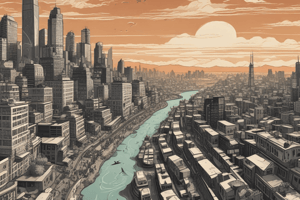Podcast
Questions and Answers
What percentage of Americans lived in an urban setting by 1900?
What percentage of Americans lived in an urban setting by 1900?
- 20%
- 50%
- 30% (correct)
- 10%
Which city held more than two million people by 1900?
Which city held more than two million people by 1900?
- Omaha
- Chicago
- Philadelphia
- New York City (correct)
What process do historians call the concentration of people into cities?
What process do historians call the concentration of people into cities?
- Ruralization
- Suburbanization
- Industrialization
- Urbanization (correct)
What technological achievements allowed industry to flourish and made agriculture efficient?
What technological achievements allowed industry to flourish and made agriculture efficient?
What contributed to the tremendous growth in heartland cities like Omaha?
What contributed to the tremendous growth in heartland cities like Omaha?
What book did Jacob Riis publish in 1890?
What book did Jacob Riis publish in 1890?
What did the new housing law in New York City fix?
What did the new housing law in New York City fix?
What did urban planning seek to produce solutions for?
What did urban planning seek to produce solutions for?
What did conservation groups urge the creation of in the Progressive Era?
What did conservation groups urge the creation of in the Progressive Era?
What did New York preserve with the carefully planned Central Park?
What did New York preserve with the carefully planned Central Park?
What was the primary reason for the influx of immigrants into Northern American cities around the turn of the century?
What was the primary reason for the influx of immigrants into Northern American cities around the turn of the century?
Which factor contributed to the unsanitary living conditions in urban areas during the Gilded Age?
Which factor contributed to the unsanitary living conditions in urban areas during the Gilded Age?
What was a common language-related challenge faced by immigrants in urban areas during the Gilded Age?
What was a common language-related challenge faced by immigrants in urban areas during the Gilded Age?
What led to overcrowding and unsafe living conditions in urban housing during the Gilded Age?
What led to overcrowding and unsafe living conditions in urban housing during the Gilded Age?
What prompted the upper class to become aware of the dire situation in cities during the Gilded Age?
What prompted the upper class to become aware of the dire situation in cities during the Gilded Age?
Flashcards are hidden until you start studying
Study Notes
The Challenges and Contradictions of Urbanization in the Gilded Age
- Around the turn of the century, 25 million immigrants flooded Northern American cities from Europe, Russia, and Asia, seeking the 'American Dream.'
- Most immigrants were between 15 and 30 years old, and they faced the choice of life in European slums or American cities with promise of work and education for their children.
- Urban areas in the Gilded Age offered cultural and technological marvels, such as museums, theaters, electric lighting, and telephones, but also had a dark underside.
- Cities lacked basic health and safety infrastructure, with insufficient trash pickup, fire departments, sewers, and regulations for air and water quality.
- The influx of people and horses led to unsanitary conditions, with half a million pounds of manure left on the streets of New York daily, and pollution from industries and households.
- Ethnic enclaves and language barriers led to social segregation, with more than half of the residents in some cities speaking no English at all.
- Housing was a serious issue, with overcrowding leading to families crammed into unsafe, windowless rooms in makeshift buildings prone to collapse and fire.
- The emergence of 'dumbbell tenements' attempted to address housing regulations, but resulted in overcrowding and unsanitary living conditions.
- New York City was the most densely populated city in the world in 1895, with some areas holding 800 residents per acre, leading to unbearable living conditions in the summer.
- Urban slums were rife with disease, including influenza, smallpox, cholera, dysentery, tuberculosis, and typhoid, due to contaminated water and unsanitary living conditions.
- Homelessness was rampant, particularly among orphaned children, who would have relished the opportunity to live in a tenement despite its deplorable conditions.
- The upper class became aware of the dire situation in cities through the investigative journalism of muckrakers, leading to the emergence of urban planning as a response to the challenges of urbanization.
Studying That Suits You
Use AI to generate personalized quizzes and flashcards to suit your learning preferences.




